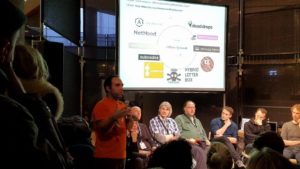Demonstration
At Foyer Hub 3
Over the last 18 months a team of artists, engineers, programmers, designers and researchers have been building Superglue – a visual web authoring tool and personal server, which enables you to make your own websites and host them at home. The Superglue visual web authoring tool comes as a handy browser add-on, which enables you to create websites directly in the browser window. To host your website at home the team of the project developed the Superglue personal server, which comes as a preconfigured device which you plug into the wall and instantly have your own Internet server. Superglue is a tool based on the original DIY (Do-It-Yourself) ethos of the Internet.
After its test launch in October 2014, Superglue is now open for public trials. For transmediale 2015, team members Michael Zeder, Abigail Smith and Teresa Dillon will provide a short overview of Superglue, demonstrating how the author tool and server works and discussing the ideas behind the project.
Participants can bring their own routers (TP-LINK TL-WR710N or D-Link DIR-505) or try the pre-configured devices that will be available for public test.
Bringing a laptop will be in any case necessary.
Superglue is developed by Danja Vasiliev, Joscha Jaeger, Michael Zeder in collaboration with Teresa Dillon, VERBALVISUAL and zerbamine.
Facilitated by: WORM.
Supported by: Greenhost
>superglue.it





